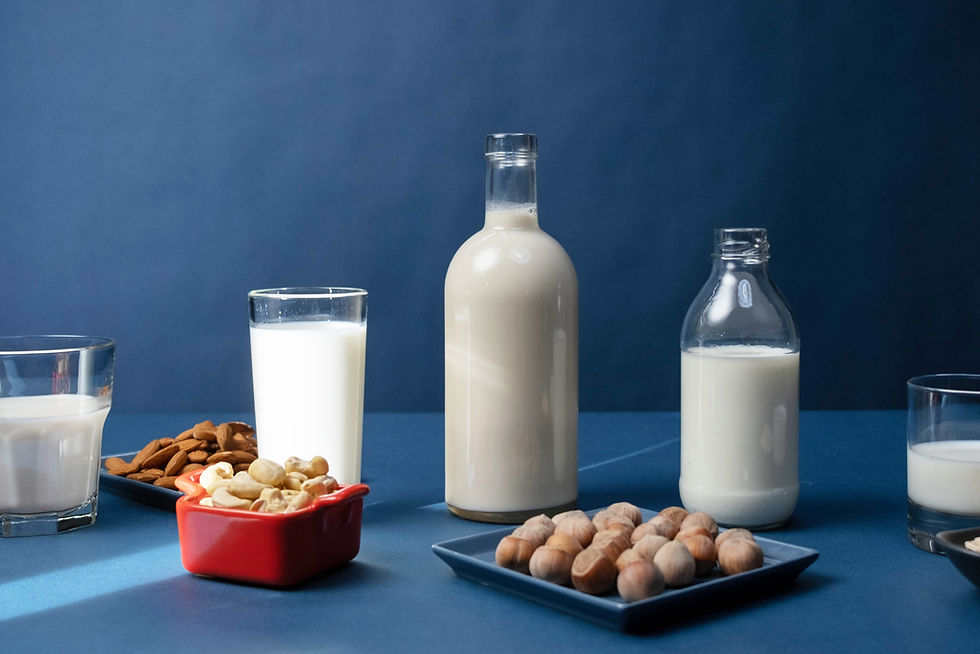Beyond the Menu: Living—and Thriving—with Food Allergies
- Elizabeth Hamilton-Guarino

- Jun 9, 2025
- 4 min read
By Elizabeth Hamilton-Guarino

Food allergies aren’t a preference or a trend—they’re a matter of survival. One wrong bite isn’t an inconvenience, it’s a life-or-death emergency.
Imagine being afraid of your next bite. Imagine that something as ordinary as a cookie or a salad—or the steam rising from someone else’s dish—could change the course of your day, or even threaten your life.
For more than 33 million Americans, that’s not imagination. That’s reality.
I developed life-threatening food allergies as an adult, after one of my pregnancies. Tree nuts, peanuts, fish, and shellfish, four foods I had eaten my entire life and even craved during pregnancy, suddenly became dangerous. In fact, just a trace amount could send me into Anaphylaxis, a rapid-onset allergic reaction that affects the entire body and can be fatal without immediate treatment.
Food allergies are unpredictable. They don’t always start in childhood. They don’t always run in families. And they’re far more common than most people realize.
The Truth About Food Allergies
Let’s set the record straight: food allergies are not food preferences. They’re not about being picky or following a fad diet. They are serious, complex immune system responses that require vigilance, preparation, and courage.
When someone with a food allergy eats—even a trace of—their trigger food, their immune system sees it as a threat and launches a full-scale attack. That’s not a stomachache. That’s anaphylaxis. And it’s a medical emergency.
The most common food allergens include peanuts, tree nuts, shellfish, fish, milk, eggs, wheat, soy, and sesame. For many people, even airborne particles or cross-contact can be dangerous.
Despite the growing number of people affected, misunderstandings persist. I’ve been told to “just eat around it,” asked if I’m “really allergic,” and had my condition dismissed as dramatic. These responses aren’t just hurtful—they’re dangerous.
The Emotional Weight of Allergies
Living with food allergies is more than just a dietary restriction—it’s a daily negotiation between survival and normalcy. It means living in a world where something as simple as a shared snack or a mislabeled ingredient can become a medical emergency.
Every meal becomes a moment of calculation and courage. We read labels like detectives, pack safe food like strategists, carry epinephrine like warriors, and ask hard questions—again and again—because we have to. One mistake, one assumption, one act of negligence can change everything.
But the emotional weight goes deeper than logistics. It’s the anxiety of being “the one who needs special treatment.” It’s the fear of not being believed. It’s the heartbreak of feeling excluded at birthday parties, restaurants, or even family dinners. For most people, food is celebration. For us, it’s often vigilance wrapped in a smile.
Dining out isn’t casual—it’s calculated. Traveling isn’t relaxing—it’s a risk that requires exhaustive preparation. Attending events can feel like walking into a room filled with invisible traps. And yet—we go. We show up. We adapt.
Because food allergies don’t just shape our routines—they shape our resilience. Beneath the fear lives strength. Beneath the anxiety, there’s a fierce determination to live fully, love boldly, and advocate not just for ourselves—but for every child, teen, and adult who’s ever felt unsafe around something as essential as food.
This is the weight we carry—and the power we build.
Choosing Empowerment
Living with life-threatening food allergies has taught me more than just how to avoid certain foods—it’s taught me how to stand tall in a world that often doesn’t understand. I’ve learned how to travel with confidence, speak up in restaurants, ask the right questions, and walk away from situations that feel unsafe. I’ve become a passionate educator and advocate, using my voice on national platforms and co-authoring children’s books that help kids with allergies feel not just included—but empowered.
Managing food allergies isn’t just about restriction. It’s about resilience, radical self-awareness, and setting unapologetic boundaries. It’s about rewriting the narrative—from fear to ownership. And most of all, it’s about leading with compassion—because when we advocate for ourselves, we create space for others to do the same.
What You Can Do
Whether or not you live with food allergies, you can make a difference:
Believe people when they say they have a food allergy. Don’t minimize their experience.
Ask questions and be inclusive. If you’re hosting or cooking, read labels and create safe spaces.
Support allergy-friendly policies. From clear food labeling to allergen awareness in restaurants, these changes save lives.
Educate your children. Teach them to be kind and curious—not afraid or dismissive—when someone has different food needs.
Find Support. Learn more at Food Allergy and Anaphylaxis Connection Team (FAACT) where you can explore resources, programs, and community support for a Safer Tomorrow
Compassion, not judgment, is what helps people feel safe and seen.
Final Thoughts
Living with food allergies has changed my life in unexpected ways. It has made me braver, more aware, and more compassionate. It’s made me a stronger advocate—not only for myself, but for others navigating invisible conditions.
So the next time you see someone reading a label three times or wiping down a table before eating, understand: they’re not being difficult. They’re choosing to live—fully and safely. And that’s something we should all support.

Elizabeth Hamilton-Guarino is the founder and CEO of The Best Ever You Network, a global platform dedicated to helping individuals live with authenticity, resilience, and purpose. She is the award-winning, bestselling author of The Change Guidebook, The Success Guidebook, and co-author of The Peace Guidebook. A leading voice in personal development and empowerment, Elizabeth is also a passionate, lifelong advocate for food allergy awareness and education. As a national spokesperson for the Food Allergy & Anaphylaxis Connection Team (FAACT), she uses her voice and platform to advance safety, compassion, and inclusion for individuals and families navigating life-threatening food allergies.












Comments